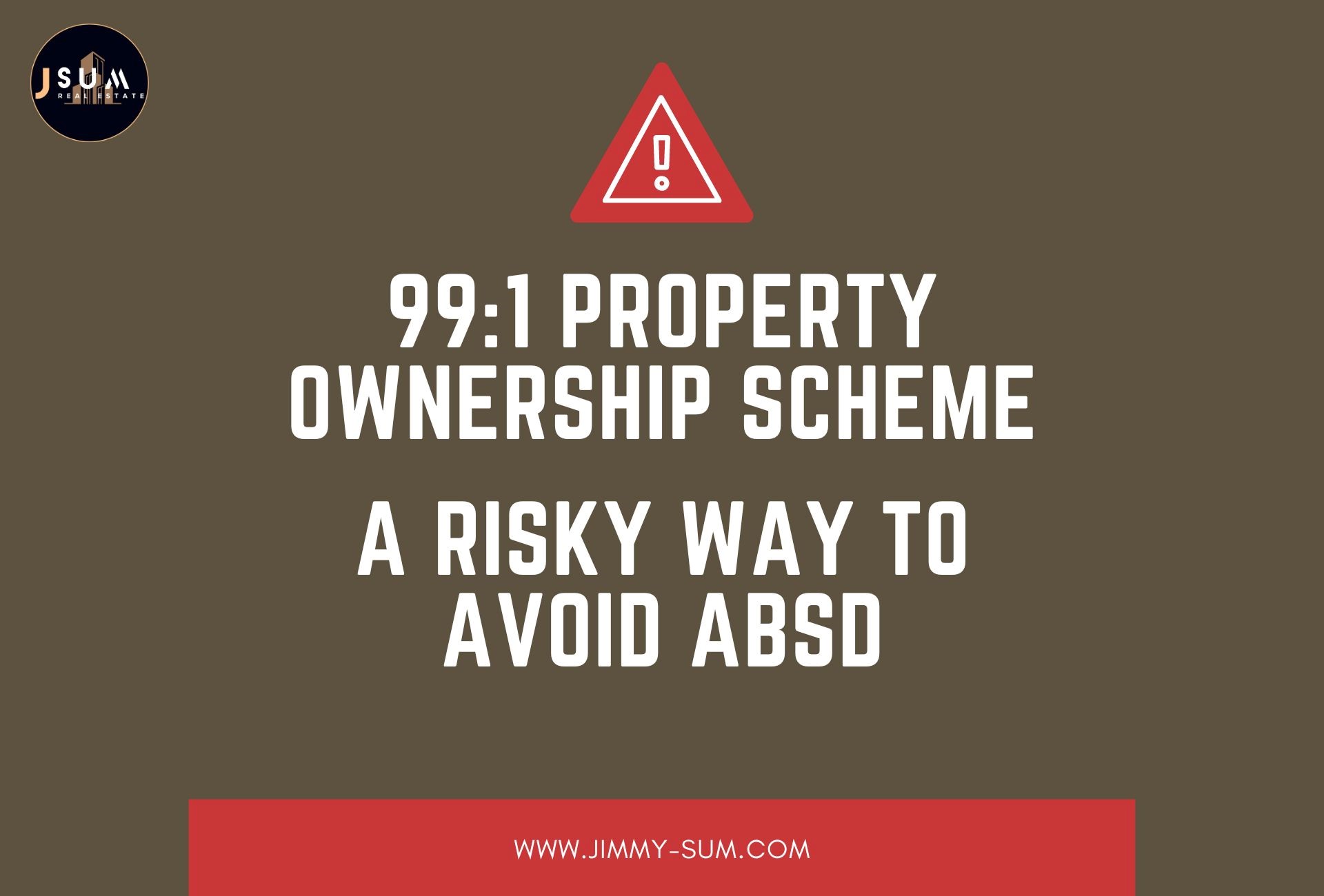Navigating Singapore’s property market can be a daunting task, especially with the Additional Buyer’s Stamp Duty (ABSD) looming over potential buyers. This tax, designed to cool the property market and prioritize first-time homeowners, adds a significant cost for those purchasing second or subsequent properties. In response to this financial hurdle, some buyers have turned to a controversial strategy known as the 99:1 ownership scheme.
The 99:1 scheme involves splitting property ownership unequally, with one buyer holding 99% of the shares and another holding 1%. This arrangement has been used to circumvent ABSD, as the buyer with the 1% share may be liable for a much lower ABSD payment. While this may seem like a clever workaround, it’s important to understand the risks involved.
This article delves into the mechanics of the 99:1 scheme, exploring how it works, its potential benefits, and the significant legal and financial risks it poses. While it may offer a tempting way to avoid ABSD, the 99:1 scheme is a risky gamble that could lead to hefty fines, legal battles, and complications in property transactions.

How Does the 99:1 Scheme Work?
The 99:1 property scheme, structured as a tenancy-in-common arrangement, is a method employed by some buyers in Singapore to potentially reduce their Additional Buyer’s Stamp Duty (ABSD) liability. This tax, implemented to cool the property market, imposes a higher rate on individuals purchasing second or subsequent properties. The 99:1 scheme involves two buyers acquiring a property together, but with vastly unequal ownership shares – 99% for one buyer and 1% for the other.
How It Typically Works (An Example)
A common scenario involves a parent who already owns property and wants to buy another property under the name of his child, who is a first-time buyer. Instead of jointly purchasing the property, they structure the transaction in two stages:
Initial Purchase
The child, as a first-time buyer, purchases the entire property under his name. Due to his first-time buyer status, he may be exempt from ABSD or incur a lower rate.
Subsequent Transfer
Shortly after the initial purchase, the child sells a 1% stake in the property to the parent. Since the parent already owns property, they only incur ABSD on this 1% share. However, this amount is significantly less than the ABSD that would be levied on the entire property if purchased jointly from the outset.
This strategic arrangement allows the buyers to take advantage of the first-time buyer exemption or reduced ABSD rate in the initial purchase. By transferring a small share after the initial purchase, they aim to minimize their overall ABSD burden.
Co-ownership Benefits
The 99:1 scheme’s unique structure offers certain benefits for both parties involved:
For the 99% Owner (Usually the First-Time Buyer)
- Sole Legal Ownership: While the 1% owner has a stake, the 99% owner retains the majority of control and decision-making power over the property.
- Potential for Full Ownership: In the future, the 99% owner could buy over the remaining 1% share, gaining full ownership of the property.
For the 1% Owner (Usually the Existing Property Owner)
- Financial Contribution: Despite the small stake, the 1% owner can still contribute financially to the property purchase, aiding with down payment or mortgage repayments.
- Loan Co-Applicant: This is a key benefit. By becoming a co-owner, even with a minimal share, the 1% owner can be a co-applicant for the property loan. This leverages their income and creditworthiness, potentially resulting in a larger loan amount or better interest rates than if the first-time buyer applied alone.
- Investment Opportunity: The 1% owner gets a stake in the property’s potential appreciation, even if it’s a small share.
Although the 99:1 scheme may seem appealing, it carries significant legal and financial risks such as disputes between co-owners, complications in property transactions, and potential legal repercussions can arise from this arrangement.
Legal Risks of the 99:1 Scheme
The Inland Revenue Authority of Singapore (IRAS) views the 99:1 scheme with a critical eye, considering it a potential form of tax evasion. The scheme’s primary purpose, according to IRAS, is to circumvent the intended purpose of ABSD, which is to curb excessive property speculation and prioritize first-time homeowners. By artificially splitting ownership to minimize ABSD liability, the scheme goes against the spirit of the law.
If IRAS determines that a 99:1 arrangement was used to evade ABSD, the consequences can be severe:
- Clawback of Unpaid Taxes: IRAS has the authority to reclaim the full amount of ABSD that should have been paid, along with a penalty of 50% of the underpaid amount.
- Additional Penalties: In more serious cases, IRAS can impose penalties of up to 4 times of the underpaid ABSD. This means buyers could face fines several times higher than the amount they were trying to save.
- Legal Prosecution: In extreme cases of blatant tax evasion, individuals involved in the scheme could face criminal prosecution, resulting in fines and even imprisonment
While there are no publicly available court cases specifically addressing the 99:1 scheme, IRAS has made it clear that they are actively investigating such arrangements. In May 2024, IRAS announced that they had recovered S$60 million in unpaid ABSD and penalties from 166 cases involving the 99:1 scheme. This serves as a stark warning to buyers who might consider engaging in similar practices.
The legal risks associated with the 99:1 scheme is substantial. The potential for hefty fines, clawback of unpaid taxes, and even legal prosecution makes it a high-stakes gamble. Buyers should carefully consider these risks and consult with legal professionals before entering into such arrangements.
Financial Risks of the 99:1 Scheme:
While the 99:1 scheme may initially appear to be a financially savvy move, it carries significant financial risks that could outweigh any potential ABSD savings.
- Selling the Property: Selling a property with unequal ownership shares can be challenging. It requires agreement from both co-owners on the selling price, timing, and other terms. Disagreements could lead to delays, legal disputes, or even the inability to sell.
- Refinancing: Refinancing a 99:1 property can be complex. Bank may be hesitant to approve refinancing due to the unequal ownership structure and potential complications in the event of default. This could result in limited refinancing options and potentially higher interest rates.
- Additional Legal Costs: The 99:1 arrangement involves more complex legal documentation and potential ongoing legal consultations, adding to the overall cost of property ownership.
There can be potential for disputes among co-owners such as having unequal power where the 99% owner holds significantly more power in decision-making regarding the property, potentially leading to disagreements and conflicts with the 1% owner. Not only that, disputes over profits can happen in the event of selling the property where disagreements over the distribution of profits based on the unequal ownership shares could lead to disputes and potential legal battles.
In situations where there are changes in their financial circumstances, if one co-owner’s financial situation changes, it could impact their ability to contribute to mortgage payments or property maintenance, leading to financial strain on the other co-owner and potential legal disputes.
Bankers will be very cautious in assessing the borrowing capacity of a 99:1 property especially after IRAS check has taken place. This could result in a much lower loan amount than expected or even no loan will be granted as a result.
After thinking through, the financial risks of the 99:1 scheme are substantial. Potential complications in property transactions, disputes among co-owners, and adverse impacts on mortgage eligibility can undermine the perceived financial benefits of this arrangement. Buyers should carefully weigh these risks and seek professional advice before entering into a 99:1 ownership scheme.
Alternatives to the 99:1 Scheme:
While the 99:1 scheme may seem like a tempting solution to avoid ABSD, it’s important to consider other legal and transparent alternatives:
- Decoupling: This involves one co-owner transferring their share of an existing property to the other, relinquishing their ownership. This allows the transferring party to be considered a first-time buyer for their next purchase, potentially qualifying for ABSD exemption or a lower rate.
- Paying ABSD Upfront and Seeking Remission: Buyers can opt to pay ABSD upfront when purchasing a property and then apply for remission later if they meet specific criteria, such as selling their existing property within the stipulated timeframe.
Each of these alternatives has its own pros and cons, and the best choice will depend on your specific situation and long-term goals. It’s essential to weigh the costs and benefits carefully and seek professional guidance to navigate the complexities of ABSD regulations and make sound financial decisions.
Conclusion
In conclusion, the 99:1 scheme, while offering potential ABSD savings and co-ownership benefits, is a high-risk strategy fraught with legal and financial pitfalls. Engaging in this scheme could lead to severe consequences, including:
- Clawback of Unpaid ABSD: The Inland Revenue Authority of Singapore (IRAS) is actively investigating and cracking down on such arrangements, with the power to reclaim unpaid taxes and impose hefty penalties.
- Additional Fines and Penalties: Buyers involved in the scheme could face additional fines of up to 400% of the unpaid ABSD, significantly outweighing any potential savings.
- Legal Prosecution: In severe cases, individuals involved could face criminal charges and potential imprisonment.
- Financial Complications: The scheme can lead to difficulties in property transactions, disputes among co-owners, and challenges in securing favorable mortgage terms.
Therefore, it is crucial for potential buyers to exercise caution and prioritize legal compliance when navigating Singapore’s property market. Seeking guidance from qualified legal and real estate professionals like Jimmy Sum is essential to understand the complexities of ABSD and explore alternative, legitimate strategies to manage this tax liability. Remember, informed decision-making is key to a successful and legally compliant property investment journey.





